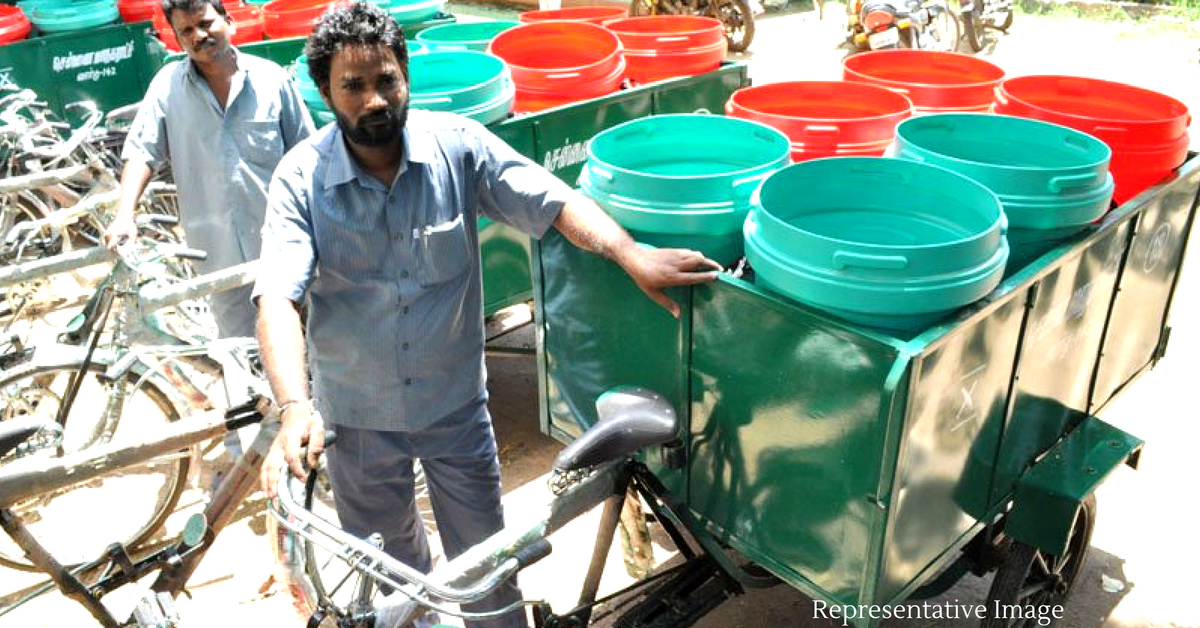Door-to-door garbage collection in India’s cities is not only a slow and inefficient way to collect waste, but workers often complain of contemptuous treatment, and exposure to dangerous infections due to handling trash.
In the hope that this will soon be a thing of the past, Tamil Nadu will soon introduce battery-operated three-wheelers across the state.
As reported in the Times of India, the state government is all set to procure around 1,694 garbage collecting vehicles. All this is a part of a massive Rs 654 crore plan, under the Swachh Bharat Mission.
So how do these vehicles work?

According to officials with the Commissionerate of Municipal Administration, these vehicles contain rechargeable batteries and are equipped with different bins, to collect different kinds of trash. The machines will help cut trash collection times, segregate waste and provide sanitary workers with the much-needed dignity of labour while cutting down the risks they face when they are exposed to garbage.
Chennai will be endowed with 100 vehicles, costing around Rs 2 lakh each, and the 3-wheelers will replace the age-old tricycle carts that civic bodies across the state use as of now.
The sanitation workers will be in the driver’s seat, ensuring that waste is adequately segregated before dropping it off at designated locations, according to an official.
The plan is in motion and was approved by a high-powered committee at a meeting held a week a week before this report.
G Prakash, the Chennai Municipal Commissioner, is optimistic about this project and told TOI that the machines would help reduce the mountains of trash in the city. Additionally, the vehicles with their speedy collection process will allow workers to cover around 1,200 households daily, moreover without touching the waste they collect.
This plan by the authorities will offer cash incentives to conservancy staff including contract workers, to motivate them to work more efficiently. The workers will drop off the biodegradable waste to ward-level composting centres, where it will be turned into manure, while recyclable plastic waste will be re-sold to corporation-recognised dealers at Rs 6 per kilo.
What’s more, the workers can keep the proceeds. Prakash added that every worker could potentially earn Rs 7,500 per month by selling covers, bottles and other recyclable plastic items.
You may also like:- How Indore Became Garbage-Free and Beat Every Other City to It
Not everyone is in a celebratory mood, though. The corporation workers themselves are nervous, and as Srinivasulu, an employee pointed out, the mechanisation of processes can lead to layoffs. The worker perhaps echoes the sentiment of his colleagues, when he hopes that the machines will not cost him his job, but instead help him to work better, and also improve the quality of his life.
(Edited by Gayatri Mishra)
Like this story? Or have something to share? Write to us: contact@thebetterindia.com, or connect with us on Facebook and Twitter.
If you found our stories insightful, informative, or even just enjoyable, we invite you to consider making a voluntary payment to support the work we do at The Better India. Your contribution helps us continue producing quality content that educates, inspires, and drives positive change.
Choose one of the payment options below for your contribution-
By paying for the stories you value, you directly contribute to sustaining our efforts focused on making a difference in the world. Together, let's ensure that impactful stories continue to be told and shared, enriching lives and communities alike.
Thank you for your support. Here are some frequently asked questions you might find helpful to know why you are contributing?
